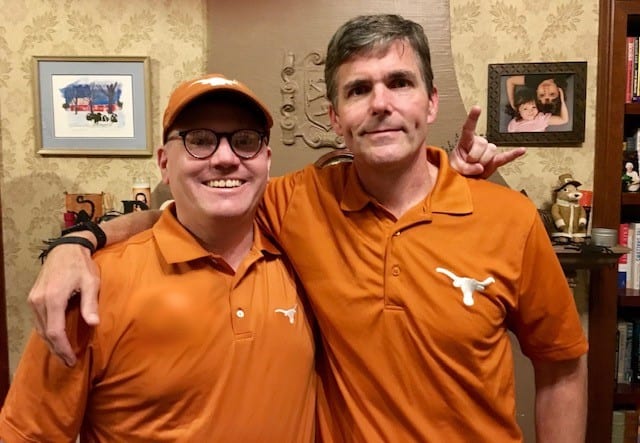
Old Friends
“Are you in any pain?” he asks, his eyes opened wide and his body bent slightly forward in the passenger’s seat of my car.
Tom and I have known each other for over 30 years. Having met at Davidson College in 1986, we now live in Austin with our families. We’re much closer friends now than we were in college, and I don’t recall meeting a kinder or more generous person.
We sit in the Brazos parking garage on The University of Texas campus, having just arrived for the first football game of the 2017 season. It’s hot outside, so we welcome the garage’s shade and a brisk breeze blowing through it.
My favorite team since childhood and Tom’s adopted team, the Texas Longhorns will play the University of Maryland before a capacity crowd in the iconic Darrell K. Royal Stadium. Sporting customary burnt orange shirts that serve as a Texas fan’s uniform, we’ve come prepared.
A Poignant Conversation
He asks whether I’m in pain because I’ve just told him about my Parkinson’s disease. Other than my wife, Tracey, and my parents, hardly anyone knows what I carry deep within me, namely, the awareness that my life has been irreversibly jarred by this diagnosis. It’s been nearly a year, and I still strangle when trying to speak this new truth.
“I don’t really have any pain,” I say, “mainly discomfort, with stiffness and slowness on my left side; but things will get worse over time…it’s progressive.”
The corners of his mouth now turned slightly downward, Tom listens and nods along as I speak. A part of me wishes we were 30 years younger and talking about Davidson basketball.
“As you might quess, I worry about the future—and especially about parenting Meredith and Holly. They’re still so young. I’m also anxious about professional implications, even though my doctors tell me I should do well for a long time. And, of course, once people know, you risk them seeing you differently…and treating you differently,” I say.
I pause. Other than the wind blowing, silence fills the car.
“But I feel so fortunate to have a great wife,” I say. “She hasn’t wavered in her support and positive outlook; and my parents, they’ve been amazing. Also, I think the girls will handle it well, once we tell them; and we have a strong community of friends that I can lean on if the need arises,” I say.
Speaking these beliefs makes them feel even truer. Calms me, too.
Again, Tom nods. “I’m sorry,” he says, “sorry you’re facing this.”
I then walk him through the last year, from the faint tremor in my left index finger, which sent me to see my doctor, to visits with two neurologists, a DaTscan, and moving conversations with my parents.
He continues to listen, with focused eyes and without interruption.
Comrades
When I finish, he says, “I’ll walk with you on this journey, Allan. Count on me.”
I smile and nod.
“But how can I help now?” he says.
I’m not really sure how to answer him. Still punch drunk from Parkinson’s blows, I struggle to find my bearings.
“You’re helping already. And I appreciate it,” I say. “I’ll let you know if there’s anything else as I figure more of this thing out. I might need you to talk me off the ledge sometime.”
I chuckle. He smiles.
“I’m here for you, Brother,” he says. “For your family, too…and Shelby and our girls will be as well.”
“I know. And I’m grateful for that,” I say.
We sit there for another moment, and then step out of the car and meet behind it before moving quickly into a handshake that glides into a brief but firm hug and ends with a back slap.
I exhale.
Checking to make sure the tickets are in my shirt pocket, we turn together toward the stadium, where a sea of burnt orange awaits us.
“Hook ‘em Horns!” I say.
“Hook ‘em!” says Tom.
***
I recall what Ralph Waldo Emerson observed, namely, “It is one of the blessings of old friends that you can afford to be stupid with them.” [1]
My friendship with Tom began this way, as being stupid marked too much of my college experience. But now it’s different. As middle-aged men with wives, daughters, and careers, we navigate the various joys and challenges that inevitably come in this season of life. Too often, we navigate the challenges in silence, and without the help of our friends.
Or, at least I do.
Which is why something else Emerson said rings so true: “A friend is a person with whom I may be sincere. Before [whom] I may think aloud.” [2]
_____
- Ralph Waldo Emerson, “Friendship,” in The Essays of Ralph Waldo Emerson (Cambridge, Mass: Harvard College, 1979), 111-128.
- ibid.
Allan Cole is a professor in The Steve Hicks School of Social Work at The University of Texas at Austin. Diagnosed with Parkinson’s in 2016, at the age of 48, he serves on the Board of Directors at Power for Parkinson’s, a non-profit organization that provides free exercise, dance, and singing classes for people living with Parkinson’s disease in Central Texas, and globally via instructional videos. He also serves as a Community Advocate for ParkinsonsDisease.net, writing columns about living well with Parkinson’s. He is author or editor of 10 books on a range of topics related to bereavement, anxiety, and spirituality; and currently, he is writing a book on counseling people with Parkinson’s disease, which will be published by Oxford University Press.
Follow him on Twitter @allanhughcole
